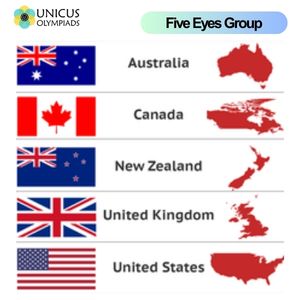

Defense groups like the Five Eyes play an essential role in maintaining global security, intelligence sharing, and strategic military cooperation. The Five Eyes (FVEY) is a unique and highly influential intelligence alliance between five countries: Australia, Canada, New Zealand, the United Kingdom, and the United States. The members of the Five Eyes have deep, long-standing military and intelligence partnerships, which allow them to share sensitive information, coordinate security efforts, and protect against common threats, such as terrorism, cyber-attacks, and military aggression. This article explores the origins, functions, and global significance of the Five Eyes and why it is a crucial defense alliance in today's interconnected world.
The Five Eyes alliance dates back to World War II and the early stages of the Cold War. Initially, the collaboration began as an intelligence-sharing agreement between the United Kingdom and the United States. This early partnership, known as the UKUSA Agreement, was signed in 1946 and formalized the sharing of signals intelligence (SIGINT) between the two countries. Over time, Australia, Canada, and New Zealand joined the agreement, leading to the formation of the Five Eyes alliance.

The UKUSA Agreement, signed in 1946, laid the foundation for the Five Eyes alliance. It was initially focused on the collection and sharing of communications intelligence, particularly signals intelligence (SIGINT). This agreement was a response to the need for better cooperation in the intelligence community, particularly in the aftermath of World War II, as the global geopolitical landscape was shifting during the early stages of the Cold War.
By the 1950s, Canada, Australia, and New Zealand became formal members of the intelligence-sharing network. Each member had close political and military ties to the United States and the United Kingdom, making them ideal partners for intelligence cooperation. The expansion of the alliance allowed for more comprehensive surveillance and intelligence-sharing across the globe, particularly in the context of the Cold War, where the threat of Soviet expansionism and espionage was at its peak.
The Five Eyes alliance serves several vital functions in global defense and security. Its main role is to facilitate the sharing of intelligence among its members, helping them protect their national security interests and respond to global threats in a coordinated manner. The alliance is particularly important in the context of counterterrorism, cyber threats, military intelligence, and international security. Below are the primary functions of the Five Eyes:
The Five Eyes alliance is primarily focused on intelligence gathering and sharing, particularly signals intelligence (SIGINT). SIGINT involves the interception of electronic communications, such as phone calls, emails, and radio transmissions, as well as surveillance of digital networks. The alliance’s collective intelligence infrastructure allows its members to monitor a broad range of global threats and share critical information that can prevent attacks, identify terrorists, or provide early warnings of military aggression.
Beyond intelligence sharing, the Five Eyes members collaborate on military and defense issues, conducting joint military exercises, coordinating defense strategies, and aligning military policies to protect their shared interests. The collective military strength of these nations, particularly the United States and the United Kingdom, provides significant influence in global defense matters.
As technology has advanced, the Five Eyes have become increasingly involved in cybersecurity, particularly in countering cyber-attacks, hacking, and espionage. The alliance plays a central role in protecting critical infrastructure, government networks, and private sector data from cyber threats posed by hostile nation-states, criminal organizations, and terrorist groups.
The Five Eyes countries exert significant diplomatic influence in international forums, particularly on issues of global security. Their shared intelligence and military cooperation give them a unique voice in global diplomacy, allowing them to collectively push for resolutions in the United Nations, NATO, and other international bodies.
The Five Eyes alliance has played a critical role in numerous high-profile global security efforts, particularly in counterterrorism, intelligence sharing, and diplomatic cooperation. Below are some key examples of the alliance’s involvement in global issues:
Since the September 11, 2001, attacks, the Five Eyes have been deeply involved in counterterrorism efforts, particularly in tracking and dismantling terrorist networks. The alliance has shared intelligence on terrorist cells, planned attacks, and movements of key terrorist leaders, helping to prevent attacks and bring perpetrators to justice.
In 2013, former National Security Agency (NSA) contractor Edward Snowden revealed classified information about surveillance programs conducted by the Five Eyes, particularly the NSA’s global surveillance efforts. While controversial, the revelations sparked debates about privacy rights, government surveillance, and the balance between security and civil liberties.
In response to increasing cyber threats from countries like China and Russia, the Five Eyes countries have coordinated efforts to protect critical infrastructure and counter cyberattacks. These efforts include sharing information on vulnerabilities, engaging in joint cybersecurity operations, and imposing sanctions on state-sponsored cybercriminals.
While the Five Eyes alliance has been highly successful in many areas, it is not without its criticisms. Some of the main challenges facing the alliance include concerns about privacy rights, overreach, and transparency.
The Five Eyes alliance remains one of the most influential intelligence-sharing and defense cooperation networks in the world. Its role in global security, particularly in counterterrorism, cybersecurity, and military coordination, has proven indispensable in addressing complex international challenges. While it faces criticisms and challenges, the collective strength and expertise of its members make the Five Eyes a central player in safeguarding national and global security. As global threats continue to evolve, the Five Eyes will likely remain a key pillar of international cooperation, helping to protect freedom, peace, and stability around the world.